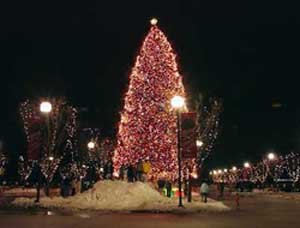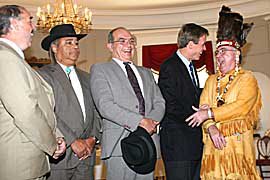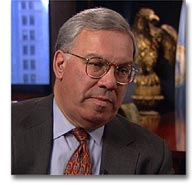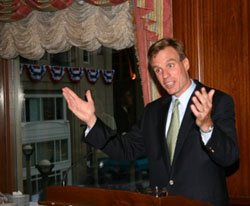Imagine There’s No Heaven: John Lennon’s Shamanic Journey
This essay was recently published in The Free Liberal (August 19, 2005) at the time of the opening of the Broadway musical “Lennon.” I wrote it several years ago and it is part of a work-in-progress about transitions in culture. A much longer version appears on Cynthia Lennon’s web site with dense footnotes and far more mischief, under the name Parthalon Flyingsnake DeCoursy, posted there on the 40th anniversary of the arrival of The Beatles in America (http://www.lennon.net/community/view_topic.asp?tid=355). (Youth wants to know: Who is Parthalon Flyingsnake DeCoursy? See “Quigley in Exile” [links] which features advanced dharma, but after Thanksgiving. I’m too busy.) Lennon is endlessly interesting. As it was said of Robin Hood, his dark side was equal to his light side. All of his artistic transformation took place in England and India, then later, in the United States he appeared to enter a new reality. (From Old Soul to New Soul. Perhaps we all have. Listen to his sad song “Mother” as a good bye to England and its Earth Mother tradition – Big Ben chimes at the beginning). Still today – perhaps more so lately – there are regular spontaneous impressions of fans who compare him with Jesus, most recently in a CBC documentary on the writing of the song “Give Peace a Chance.” Thankfully, Big Nurse invariably enters the class room and whips the children, returning them back to order and sobriety.
The Sixties was a cacophony of a million sounds and smells and voices and music and colors and textures, but especially music. The electric guitar was like a key; an ancient iron ornamented key to a mediaeval dream door that would open to an age. Now that the music has stopped and the storm has subsided, it is not that difficult to determine who were the authentic voices and who were background and chorus.
Every age, every period, has a beginning, a middle and an end, like a person’s life, and this age was no exception. This age, someone pointed out, came with its own sound track. And it rose and fell rather quickly.
In the center were the Beatles, and the Sixties rose and fell with the fate of the Beatles. And at dead center, the man in the center of the Beatles was John Lennon. From beginning to end the Beatles was about John Lennon. He was not the most important innovator or instigator of the period, except in music. But the music would become secondary to the period and to his life, as literature had become secondary to Tolstoy. That is why he is important: the passage he made was one of transformation and the generation transformed with him.
He was one of us, common and working class, but of course, more gifted. And the transformation we made, he made, eventually leaving the Beatles behind to complete the passage himself. He was the man at the center who made passage with us and for us and completed the journey on our behalf. And I don’t think we could have or would have completed passage without him.
The remaining Beatles say they were transformed by Bob Dylan like the rest of us were. And John was as well. It shows in his pictures. It shows in his clothes and in music like Norwegian Wood, a folksy, spare song inspired by the folk scene, written when the Beatles would begin to rise to a higher artistic level. John, they say, wanted to conquer the world, which the Beatles did with ease. Then, when they heard Bob Dylan, they aspired to be artists.
Dylan opened the gate and performed the rite of entry to the age with his soulful cohort Joan Baez, and the age rose to the center when the Beatles reached their artistic apex. Then it followed the rite of exit with Joni Mitchell and the howling animal cries of Neil Young, mourning the passing of the brief and sacred moment. The Earth Mother arose with great electrified amplification as if to compensate for 700 years of silence in an extraordinary hippie scene at San Francisco’s Haight-Ashbury district in 1967 and 1968, then it was all over. The Rolling Stones would linger like a cloud for a decade – the Beatles energy shadow, like Santa’s Black Peter – but the tiger had already gone back into the forest by 1969.
The Beatles, at the top of their creative arc – that would be somewhere within the Sgt. Peppers area – brought the defining moment for everyone of my generation. Some 30 years later, in January, 2001, New York Times columnist Maureen Dowd, in contrasting the Sixty-ish Clintons with George Bush, Jr. in his first month in office writes, “He said he never liked The Beatles after they got into that ‘kind of a weird psychedelic period.’” One either crossed the river or did not, and those who did not, created a counter-force. (Ten weeks into his presidency Dowd reports going hungry for a shred of modernity. “Bush II has reeled backward so fast, economically, environmentally, globally, culturally, it’s redolent of Dorothy clicking her way from the shimmering spires of Oz to a depressed black-and-white Kansas,” she laments. “What’s next? Asbestos, DDT, bomb shelters, filterless cigaretttes? Patti Page?”)
John Lennon was preoccupied with Jesus. You could see it early on with the trouble he got into when the Beatles were first big. Fans would crowd them and overwhelm them and once John said to a crowd of reporters, “We’re more popular than Jesus.” There was no arrogance to it, but subtle awareness. The Beatles were more popular than Jesus.
In The Tao of Jung, psychiatrist and Jung scholar David H. Rosen discusses Jung’s descent into the shadowy world of the collective unconscious, the world beyond the conscious ego. On the way into the “cave” of the unconscious stood a dwarf with a leathery skin, as if he were mummified, which Jung squeezed past. Rosen explains this in terms of Indian mythology: “Shiva steps on a dwarf that represents the ego when this deity does its creative dance of death and rebirth.” Likewise it is with the Beatles. When they began their real creative work, they left behind the casings of their early ego identity, pictured as four mop-top wax dummies in early Beatles suits at what appears to be a burial on the cover of the Sgt. Peppers album, while the “new” Beatles appeared above like butterflies just left the cocoon in brightly colored satins and playful epaulets.
At the building vortex of their work, John went through a classic shaman’s arc, the same as the one described by Dante in The Divine Comedy; the same ascribed to Jesus by his followers thus, “. . .he descended into hell the third day . . . . he ascended into heaven.” (As E.C. Krupp writes that Santa Claus, an archaic remnant of a Norse shaman, enters the subtle realms of the archetypal shamanic journey by descending the chimney to the Underworld and flying through the Cosmic Heavens with magical reindeer.) This is the classic pattern of the journey of the shaman described by anthropologists and it occurred with John as the Beatles rose to the top of their creative arc. The man or woman who is about to enter into the role of the shaman is taken, out of nowhere and against his or her will, into a funk. He falls into a torpor, a sickness of the mind and heart and feels a worthlessness to his life, which he had previously found to be perfectly happy. He goes through a period of spiritual death and descends deep into the earth. After he ascends and rises into heaven. Finally he emerges transfigured, and enlightened god king, leaves the celestial place and comes out, usually down from a mountain with a simple transforming idea for the tribe, a gift from the land of the dead.
John went through such a transformation, falling into a psychological funk and getting fat and afraid at the peak of the Beatles initial popularity (“Help,” he sang. “I’m a loser, and I’m not what I appear to be.”) Then at the Revolver album, something new began to happen. Suddenly there is a sense of entering the river, an image which occurs in dreams at times of birth or death (“turn off your mind, relax and float downstream,”). In Taoism, it is the sign of a new awakening. He sang a second song on the same album about floating downstream in a transcendent, blissful sleep, while everyone thinks he is just lazy, (but “I don’t mind,” he sings, “I think they’re crazy”). Some say I’m Only Sleeping is aesthetically the best song he ever composed.
In terms of anthropology, this is the first orientation of the shaman getting his feet in the Underworld – the creative unconscious – the world under the earth, where he will take you down with him into the density of the earth, but the subtle realm of the earth, the Underworld, where “nothing is real” in Strawberry Fields. And there he finds clarity and confidence, but in a new world, the world of the unconscious where there is understanding of all you see with eyes closed, and the old world becomes a shell, a mere caricature of psychic life. The shaman then ascends out of the earth and into the sky, like Jesus rising out of the tomb and entering heaven. John and the Beatles rise then to the very height of their work in Sgt. Peppers Lonely Hearts Club Band. And here at their best work is the shaman’s archetypal ascent to the heavens in Lucy in the Sky with Diamonds. Like the Underworld of Strawberry Fields, the astral heavens also have otherworldly features, like newspaper taxies and magical rivers with tangerine trees and marmalade skies (like the tree “showered with reddish blossoms” blazed in light in Jung’s “vision of unearthly beauty” that was his Liverpool dream).
At the peak, John wrote a song called “I am the Walrus” in which he invoked the Upanishads, which along with The Autobiography of a Yogi was very popular back in those days. John wrote, “I am he,” about the swimming together of all of us at the peak of the Sixties, and “we are all together.” “I am the Eggman,” he sang, with his characteristic Liverpool humor, “. . . they are the Eggmen. I am the Walrus.”
It is all comic and hidden, but it reflects an awareness he had about being a man like Jesus, at the center of a world in transformation. The words, “I am he,” are from the core of Eastern spirituality and are well known to its practitioners. This expression reflects the sentiment of the Upanishads in which the Atman (the Eggman) or the individual soul, finds itself at one with another individual soul, then another, then the whole soul, the world soul, the God consciousness, the Brahmin (the Walrus). It is what Jesus had become after he had gone through the Transfiguration, referring to himself as at one with the God force, at one with the Father. This is the Brahmin consciousness.
The Beatles were at their peak with Sgt. Peppers. There John would find fulfillment, anthropologically speaking. Then he would journey to the East, although Paul and Ringo were bored, and find the mystic Maharishi Mahesh Yogi, a father figure to him, but a Great Father, a spiritual father, not an earthly father.
That is it. The shaman’s work is essentially over by then, except to bring the gift idea to the community. The shaman has brought the tribe with him through the transformation of the unconscious and then his role is up. It is up to us after that, with the idea he brought us from the dead.
Yet some of the Beatles greatest work would come as they traveled down the back side of the mountain. The White Album is still a favorite to fans. One song, I’m So Tired, wonderfully reflects the rite of exit of the exhausted artist that comes at the end of the transformational passage, balancing the liberating I’m Only Sleeping, at the rite of entry.
It is characteristic of the dark side of the passage that the archetypes reverse themselves and show themselves not as they are in the holistic form of the inner life, but just the opposite, shattered in the outside world, reflecting that the center has been passed through and we have once again entered the flat consciousness of the everyday world. And in this instance, it was a hostile world at war in Vietnam and on the streets and campuses of the United States (“Happiness is a warm gun,” sang John). Here the Beatles reject their psychological god-king, the Maharishi, and even publicly denounce him. Here John sings, “My mother is of the sky.” Lucy is of the sky, his anima, his female counterpart whom he found in the air of Aquarius. The mother is of the earth. And the tricksters continue their playful treachery, fooling their audience and keeping them off guard with pranks like this one: “ . . . here’s another clue for you all. The Walrus was Paul.”
The Walrus, of course, was John.
Coming off the backside of the mountain John sometimes believed he was carrying – channeling, we say – Jesus and said so to the Beatles. And he made occasional references, even paraphrasing the Gospel of Thomas [Ed: a long-lost gospel by the apostle Thomas, rediscovered in 1945 in Egypt, that is not included in the New Testament] (“. . . the inside is out/the outside is in. . .” on the White Album). “Christ, you know it ain’t easy,” he sang in one of his last songs, suggesting in The Ballad of John and Yoko that he, like Jesus, would be crucified.
Certainly he made himself look like Jesus at the end of the Beatles. On their last album cover, Abbey Road, he is dressed all in white, like Jesus after the Transfiguration, the Beatles trailing him across the road, like the Three Celestial Ones, following in his wake. (The old Catholic myth about the three secrets revealed to the children at Fatima by the Blessed Mother took a pernicious turn into hippie lore in the late 1990s when the Pope revealed the third secret to be about a “man in white” who would be gunned down when he returned from the mountain top. The Pope, who had been wounded in an attack at the same time that Lennon was murdered, revealed the contents of the letter to the public because he said the prophecy had been fulfilled. John Paul II, who wore white garments at public ceremonies, claimed to be the man identified in the prophecy.)
Even later, at the very end of his life, Jesus is suggested. All through the most creative period, the shaman’s journey from Sgt. Peppers to the end of Abbey Road, John wore a special flowered talisman around his neck. Afterwards, he stopped wearing it. But in New York, in one of the last pictures ever taken of him, a well-known photograph where he is wearing a t-shirt that says New York City across the front, there is a tiny cross hanging from his neck.
At the end of the Beatles period John continued the archetypal journey of the shaman whose duty it is to rejoin the world. Like Moses and the Boddhisattva, he returns from a celestial vision on top of the mountain with a simple transforming idea, as Moses did with the tablets.
It is the same idea that has occurred throughout the century but is new to our century. It is Emerson’s message and here it is again expressed ten years before the Beatles by C.G. Jung: “Our world has shrunk, and it is dawning on us that humanity is one, with one psyche. Humanity is a not unconsiderable virtue which should prompt Christians, for the sake of charity – the greatest of all virtues – to set a good example and acknowledge that though there is only one truth it speaks in many tongues, and that if we still cannot see this it is simply due to lack of understanding. No one is so godlike that he alone knows the true word.” As Woodstock guru Satchidananda put it, “One truth, many paths.”
It is the same idea that Leo Tolstoy, a Great Father figure to the non-violence movement of the Sixties, had brought to the world after his night of the dark soul when he went through a religious transformation.
Lennon, with his wife Yoko Ono, entered the peace movement when he left the Beatles, and like Tolstoy, attempted to apply his natural gifts didactically to public purpose. Lennon is said to have been reading Tolstoy’s late non-fiction work on religion and non-violence as many were in the 1960s, and his final word, the simple transforming idea he brought down from the mountain is precisely the same thought as Tolstoy’s: “Imagine there’s no country, it isn’t hard to do. . . Imagine all the people living life in peace.”
Tolstoy claimed that there was one singular thought in Christ’s work and that was do not return violence with violence. On this he built the doctrine that would inspire Gandhi and Martin Luther King, Jr. and the anti-war activists of the 1960s. Furthermore, in Patriotism and Government, Tolstoy wrote that patriotism was a practicable solution for nations early in their development, but it was time now to abandon national prejudices. Even Gandhi, who he corresponded with and who admired Tolstoy enormously, had failed in this, he said. The non-violent approach was the right approach, but, said Tolstoy, declaring the nation to be Hindu, “ruins everything.”
It was time for the removal of all barriers. No country, and no religion, too. This would be Lennon’s final impression on the people: “Imagine there’s no heaven, it’s easy if you can, no hell below us, a brotherhood of man.”
This is precisely Tolstoy’s religious conviction at the end of his life. He advocated abandoning identity with a particular prophet as one would abandon nationalism. In one of his last writings on the subject Tolstoy clearly states his opinion: “Attributing a prophetic mission peculiar to certain beings such as Moses, Christ, Krishna, Buddha, Muhammad, Haha’u’llah as well as several others is one of the major causes of division and hatred between men.”
John’s swan song, Imagine, is likely an intentional reconstruction of Tolstoyan philosophy. Intended or not, it completes the shaman’s journey and begins the transformation of the group.
William Butler Yeats writes: “What portion in the world can the artist have/Who has awakened from the common dream/But dissipation and despair?” Such was the lot of John Lennon. Later in life, in torment, he wrote, “I was the Walrus, but now I’m John.”
One of his biographers writes that he was never happy again after the Sgt. Peppers period. The pictures show it. He never smiled again for the camera after he returned from India.
 There is something here in the air of
There is something here in the air of  mushroomed in my lifetime.
mushroomed in my lifetime. So I was pleased with Boston Mayor Thomas Menino, a New Englander like myself, when he refused to submit to the Demon Spirit and call the new spruce in
So I was pleased with Boston Mayor Thomas Menino, a New Englander like myself, when he refused to submit to the Demon Spirit and call the new spruce in 

